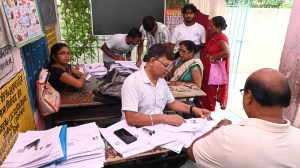Click here to join Express Pune WhatsApp channel and get a curated list of our stories
Recovered Pune businessman sets up support group with mental health experts for patients with bipolar disorder
The support group set up for people suffering from bipolar mood disorder will meet twice a week
 Rajput’s support group, which includes expert psychiatrists and psychologists who will interact and counsel the patients, will meet twice a month.
Rajput’s support group, which includes expert psychiatrists and psychologists who will interact and counsel the patients, will meet twice a month. Viren Rajput, a businessman, was in his early 30s when he would often refuse to go to work and sleep long hours. Then there would be times when he would be in a totally different phase and his mind would be filled with racing thoughts and he would indulge in reckless driving.
Talking to The Indian Express, Rajput, 59, who was diagnosed with bipolar mood disorder, and has now set up a support group for others, said, “I would work for 10-12 hours at a stretch. But suddenly, these phases would kick in. This went on for a few years and my family members were deeply puzzled about what was happening to me.”
He added, “It took at least eight-nine years for me to come back on track but today I can say that I am a recovered bipolar mood disorder patient.”
Rajput’s support group, which includes expert psychiatrists and psychologists who will interact and counsel the patients, will meet twice a month. The first meeting is scheduled for January 11.
“Family support, faith in psychiatrists, adherence to treatment and help of support groups does help a patient recover,” Rajput said. During his recovery phase, he had started volunteering with self-help groups like the one by senior psychiatrist Dr Ulhas Luktuke’s Prajit and networks like Arnawaz Damania’s Connecting NGO.
 Dr Vidyadhar Watve, consultant psychiatrist at Poona Hospital and Research Centre lauded the initiative and said that at least four per cent of the population suffers from this disorder.
Dr Vidyadhar Watve, consultant psychiatrist at Poona Hospital and Research Centre lauded the initiative and said that at least four per cent of the population suffers from this disorder.
“I firmly believe that medications and self-help can arrest, treat and manage this bipolar mood disorder,” said Rajput, who decided to set up `Samtol bipolar mood disorder support group’ or a ventilation group that helps create a safe space for people suffering from this disorder and provide a better insight to both the patient and the caregivers.
“I have made it my mission to spread awareness about mental health in society,” Rajput said and in the last 16 years, he has conducted several awareness sessions for schools, colleges, the police department, nursing colleges, slum communities and others. “At the Samtol support group, we have registered 60 patients so far,” he said.
Dr Vidyadhar Watve, consultant psychiatrist at Poona Hospital and Research Centre lauded the initiative and said that at least four per cent of the population suffers from this disorder.
Dr Sujala Watve, former Director of Jnana Prabodhini Samshodhan Sanstha said, “In Bipolar Mood Disorder, moods swing towards two ends or two poles – high and low. When the mood is at the higher end, it is a state of excessive energy, named as mania. When an individual lacks energy, or is in low mood, it is known as depression.”
Dr Watve added, “The manic state is characterised by high enthusiasm, aggression or irritability. The lower shade of it is called hypomania, which is not very high but higher than the normal mood state. The state of depression is characterised by very little or no energy, feelings of sadness, unhappiness or weakness. These states may persist for a longer duration, or swing like a pendulum from one side to the other. Some people experience only a single side of the polarity, generally depression. These mood changes can have varied duration from very short as daily or for a longer period as years together.”
“Moods affect an individual’s appetite, sleep, perception, thoughts, behaviour, attitude and reality orientation. In such cases, it may cross the limit of normality and turn into an unrealistic positive or negative outlook, which disturbs the behavioural balance,” Watve added. The entire family suffers due to a person’s moods and hence, treatment is important, he said.
Dr Ulhas Luktuke, Dr Vidyadhar Watve, Dr Sandeep Mahamuni and others will guide the support group, Rajput said, who along with his wife Meena can be reached at the helpline numbers — 9637526537 and 8793278967.
Click here to join Express Pune WhatsApp channel and get a curated list of our stories








